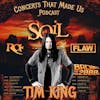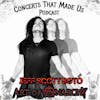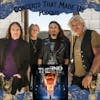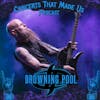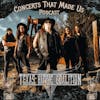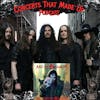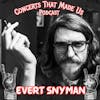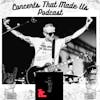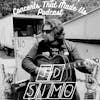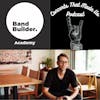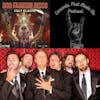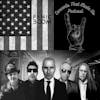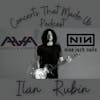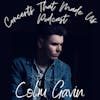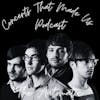Scorpion Child

This week Brian is joined by Aryn Black, Lead singer of Scorpion Child.
Scorpion child is an American rock band based in Austin, Texas. Formed in 2006, the band has experienced frequent lineup changes. They are signed to the German-based independent label Nuclear Blast and worked with Grammy-nominated producer Chris “Frenchie” Smith on their two albums. Their music has been compared to Led Zeppelin, Uriah Heep, Rainbow, and Black Sabbath, and the band also cited Krautrock and doom metal bands like Pentagram, Hairy Chapter, and Lucifer's Friend as influences.
Scorpion Child released their self-titled debut album in June 2013. In a review of the album, one reviewer described Scorpion Child as "a heavy-riffing behemoth that takes the current glut of guitar-slinging retro-copyists and punches them through the pavement." The album reached #31 on the Billboard Heatseekers chart. The song "Polygon of Eyes" was featured as the iTunes single of the week in June 2013.
Following a lineup change they released the album Acid Roulette in June 2016. The album was noted for being heavier and more progressive than its predecessor, thanks to the strengths of the new lineup, while one reviewer noted the album's "Lizzy-meets-Maiden riffage." Acid Roulette reached #19 on the Billboard Heatseekers chart.
The band are currently working on new music and preparing to tour.
Tune in to hear all about the history of Scorpion Child, Aryn's influences and musical experiences and what the future holds for the band.
Find Scorpion Child here:
https://www.instagram.com/scorpionchildofficial/
https://www.facebook.com/scorpionchild
https://open.spotify.com/artist/4unllJ7RMbdpBbTELvKwys?si=u6y8ypC5S1WIQcEACsh2-Q
Find CTMU here:
https://linktr.ee/Concertsthatmadeus
If you would like to support the show you can do so by rating/reviewing us on Itunes and Spotify or by signing up at https://www.patreon.com/Concertsthatmadeus and you will gain access to a range of benefits including video versions of the episodes.
--- Send in a voice message: https://anchor.fm/ctmu/message
Brian:
Hey, guys, welcome to another episode of Concerts That Made Us. I'm your host, Brian. Before we get to this week's episode, the answer to last week's music trivia question was, of course, Slash. Slash was the famous guitarist who found his mother in bed with David Bowie. Slash's mother was a costume designer with rock and roll clients like David Bowie, whom she dated. Slash says that awkwardness aside, he really liked David Bowie and thought he was really cool. Now for this week's music trivia question, which famous rock band started off as a tribute act to British rock band The Zombies? And we've got another fivestar review. Great idea and execution. Concerts are one of my favorite things in the world. I love attending them and I love hearing about them. With this show, I get to hear the actual experiences fans have with my favorite artists and artists I haven't heard. The host does a great job engaging with the guests and formatting to show. This review was left on itunes by Bill from The Way podcast. So thanks, Bill. And don't forget your five star reviews will be read out on the show. Now onto this week's episode. My guest is Aaron Black from Scorpion Child. I was looking forward to doing this one for a long time. They've got some excellent music and I can't wait for you to hear this episode. So without further Ado, let's get on with the show.
Brian:
Aryn you're very welcome to concerts that made us.
Aryn:
Oh, yeah. Thank you for having me.
Brian:
No problem. I'm delighted to get you on. I remember the first time I heard you guys, a fan of the show actually sent me a link and I listened to one of your tracks and I thought to myself, there's no way I can get these on the show. This is some, like, legendary band from the 70s, like Led Zeppelin or something. How am I going to track these guys down? But when I looked you guys up and seeing that you're a modernish band, I was shocked.
Aryn:
Wow, that's very cool. Thank you. Yeah.
Brian:
So before we get to the band, we'll chat a about bit your history. Do you remember, if you can, what was your very first musical memory?
Aryn:
I mean, it probably would have been Michael Jackson or Prince.
Brian:
Really?
Aryn:
Yeah. Oh, absolutely. I had a book that had all the moves that Michael Jackson does it have like A Moonwalk and his various shuffles. I'm sure a lot of those moves he kind of got from James Brown. I didn't know that. So he was a popular thing at the time. So I had this book and I would just like flip through this book, like, wow, like all this cool stuff this guy can do. Yeah. He was kind of like, definitely my introduction to music. And then I think Prince was very soon after my first concert that I remember would have been Prince and the B 52s oh, man. No, that's an introduction. Yeah, it was like an outdoor thing. I think Prince was doing the Purple Rain tour for that. They still have a shirt from that tour. I can't really wear it because it's going to fall off. I should probably frame that.
Brian:
Yeah, definitely. Especially a Prince concert. Jeez. So those were my earliest memories of music. It's not quite what I expected was fair enough. Prince, yes. But Michael Jackson, he's kind of a lot different from your style of music.
Aryn:
My skin crawls when I see performances of him in his prime. How could he keep up that energy? And those movements and that choreography, it still out. Does anything you see today?
Brian:
Yeah. He's one of them people that every so often one person comes along and totally revolutionized everything and there never be anything like him again.
Aryn:
Yeah, absolutely. I kind of feel I agree with that. Yeah.
Brian:
So do you remember when you first decided you wanted to be a musician?
Aryn:
I don't know if I decided that or if it was just decided for me by some Astral being or something. The first time I tried my hand in music, it was interesting. It was early or I guess it would have been in junior high. Yeah, it would have been like late at elementary or junior high, maybe 7th grade. There's a couple of my friends that were like jamming playing a band, listening to the Grateful Dead, you know, and I was already listening to heavy metal and stuff like that. So I came over and did some like, that's not what we're doing, but that's cool. And then I remember they got kind of converted. And then I got into later junior high, and I met some other kids that were shittier musicians than they were. And I was like, these are my guys, and we played just punk rock. Yeah. Pretty funk. Yeah. So that was really funk because that was a lot of energy there. And then we just kind of started to develop together in high school, close to the same group of guys. We just started finding out, Whoa, I can do this, and I can do that now. Really early on, I was not singing. Yeah. Just being as heavy and hardcore. It was hardcore music, and that's why I was playing in high school. I always knew I could sing. I always knew I had an acceptable voice, but it was never what I was really into. I mean, still not what I'm really into. I mean, I still love that really screamy, really intense stuff. I either like that or I like Ga. I love the classic obviously I love classic rock and British heavy metal style, like classic stuff, but in German crowd and stuff like that. But I always keep things like in the rotation. I keep all the stuff in the rotation because there's so much different, so many different kinds of music that influenced me that none of them really go away. Yeah. I get every once in a great while off throwing that late 90s Jimmy World record and be like, yes, all right. But it's funny. I'm actually starting like a hardcore band with a friend of mine who was in a bunch of hardcore bands back in the day too. And we're like older guys now doing that. We're like a basketball Jersey and like some chains just for fun. We're going to make cassettes, we're going to hand them out to people, you know, it never left me. So I guess it was a different take for me. When I hear people say, oh, Scorpion Child, it was like hearing something that sounds like Zeppelin or something that sounds like a Jewish priest. I'm always like, oh, my God, that's not even what I was raised on. I had a cousin that was listening to Pink Floyd and he's like, he had one of those first early disk Mans where if you look at it wrong, it skips. It looked like a little turntable, like a little glass thing. And you put the CD on there. I was like, looking at it like, I remember that's when I first heard Led Zeppelin and Pink Floyd and oh yeah, he had Sabbath. He had Masters of Reality too, on CD. But CDs were like these CD players, these little early disc man. Cd players were like hundreds of dollars. Yeah. I don't know how many quid they would be or how many Euro you guys are. Euro, right? Euro. Yeah. So I don't know how many Euro that would be, but probably hundreds of dollars. But yeah, he would get mad if I would like, touch it. He'd be like, Let me do this. You just put on the headphone. I remember hearing CDs with such clarity. Like it was crazy to hear music that didn't have crackles. Yeah. And obviously years later you miss the crack alone. You always come back to the crackle. Yeah. It's kind of weird, though nowadays that people have gone back to Vin. Well then, isn't it? Honestly, I don't think it's that weird. And I'll tell you why, because all through the early 90s I was buying being in a punk and hardcore and metal music, I was like, digging through, they were still making vinyl even when it wasn't cool. So I've been collecting it since I was a little kid because think about vinyl, the medium that we had to listen to when I was in the 80s, when I was a little kid, and then it went away and gave way to CDs, but I was still listening to stuff that was like pressing vinyl. And I still have those records. I never got rid of those records either. So for me it was like I never really stopped collecting vinyl cassettes and other various mediums. But I have some CDs, but I don't have nearly as many CDs. Yeah, but I mean, I respect the sound quality. They just haven't made the CD players like they made them in the beginning. They started to make them cheap, and they just didn't have the same effect.
Brian:
Yeah, you're totally right.
Aryn:
Yeah. And they just become coasters or like cocaine. There truly is a great sound quality encapsulated in this digital disc, but it's just a different kind of listen. I like to hear the warm tones and stuff that you can hear on tape and vinyl and stuff like that that you just really don't hear on CD. Like those imperfections are, I think, important. But, yeah, vinyl did make a comeback. And to me, that's what I primarily always have. Like, I had the most of that. So, yes, for 40 years, I've been lugging around a crate of a lot. Yeah, there's more crates as time goes on. I was telling you, we just bought a house. So I'm hoping that this is the last time, even though I know that I have to move 46 fucking crates of records. Oh, man. Are you serious? I need to sell. So I do these pop up markets here where vendors come and buy, sell and trade their items and stuff. So I sell vinyl. I try to get rid of stuff that I don't listen to at a reasonable price and old T shirts and stuff that I'm wearing and stuff like that. So there's really cool things that people sell. So I just keep it simple. I just sell music related things because I acquire so much of it. Yeah. Over time. And a lot of those things I hold on to, like that old Bau house, your Sister's Mercy shirt. I'm not going to get rid of that. Yes. No, you'd be crazy. 1990 skinny puppy shirt. That'd be stupid to get rid of that. I hang on to certain things because I'll never not like it. It's always going to be, you know, that print shirt since I was five. Unless somebody steals it never going anywhere. Even if I'm not wearing well, there's other things that I give or take.
Brian
Yeah. Is there a record that's your prize possession then that you'd never, ever get rid of?
Aryn:
Like, one single record, man. There's this record that I have an original processing of by an artist named Jackson C. Frank. Right. He was a folk guy, and that record saved me my life on several different occasions. It's called Blues Run the Game. And I couldn't even tell you what it's worth because it's worth a lot. I know that much. But that particular record, it's not about the monetary value of that record. It's about how it's so depressing, really. And I love depressing music. And he was like the folk singers. Folk singer. He was like the guy that Paul Simon listened to, Bird John. He was from Buffalo, New York, and he came over to England and lived there, like, in his early 20s and launched this European folk revolution that all these guys, there's this video of them playing, there's one video and it's like 15 2nd clip of him sitting there just playing by himself and it sounds and you see all these famous people in the audience and there are only 15 people in the audience and they're all people that went on to become this one guy that can write a song more powerful than most bands as far as that's probably one record I wouldn't give up. Like there's so many different styles and there's records for each style that are irreplaceable or there are records that are worth buying a new copy when the new pressing comes out so you don't have to play the older one. Yeah, I got you and mess up the older one. That's kind of cool.
Brian:
How did you jump from being into punk rock and hardcore to create an a band like Scorpion Child and find that sound?
Aryn:
It's interesting because I was like alright I've been saying for a hardcore band and a punk band and I just wanted to honestly it was 2006 and ASA who's in the band with me? Him and I started the band in 2006 when we were in our 20s and we were listening to everything from Love by the Calls like Fields of the Nephilim and we were also listening to Judas Priests and the Scorpions and it was like we wanted to mesh it all together there. But the thing is the golf side of it wasn't really happening at the time, at least in Austin, in the area amongst the people that we knew. And the Goth is derived from more death pump, like more like a death rock thing and like more of a punk thing but there were rock bands coming up doing like the MC Five Stooges kind of stuff which I mean that's like also kind of derived from like punk. We were listening to that and Cactus. I still love all that shit. So we went that route first and it wasn't really until like we just kind of brought the reunited the band after really since 2016 and I feel like now's the time in 2016 we were kind of doing this like we achieved this Deep Purple kind of vibe. We were doing that but I was starting to want to bring some of that those chorus guitars back in and just bring some of that element back into the music and then the band kind of split up and we didn't even really do a proper tour. We did our last tour with Uncle Acid and the Deadbeats across Europe and I was already wanting to. The stuff that we were going to create was going to transition back into this almost like heavy Goth wave stuff. Yeah. And then the band kind of just like fell apart but when we restarted it we were like now let's seek out people that understand this kind of music. You know what I mean, so that we can do what we've been doing and merge it with what we have always wanted to do as well. So we're going back to the beginning, almost before the beginning of the band and revisiting it altogether. So knowing what we've accomplished versus what we have wanted to explore with this man, I mean, obviously we're not going to be like a techno group or we're not going to be like acid free jazz kind of ban, but we would just change the name if that's what we wanted to do. But as long as it's Scorpion Child, there's still stuff that we came back to explore the other side. Does that make sense?
Brian:
Perfect. Yeah.
Aryn:
It's just going to be like we're going to essentially be creating something that we don't hear very often, which is the goal. When you play music, you're like, oh, man, there's bands like, actually our drummer played in the beginnings of this band called Tribulation. They're from Sweden. He's actually Swedish. He's from Sweden and has a band. And they had another band called Enforcer with his brother who also played in Tribulation. Yeah. So he lives here in Austin, so he plays drums for me now. And they're like the close to. They're kind of like black metal with a darker, dark wave kind of thing going. So that's really cool. So he understands that. And we've just wanted to bring people in that want to do like the punk and the hardcore elements of me is never left. It was always in score. Being Child, I don't perform like Ian Gillen or Robert Plant as far as what I see that I do. Yeah. To me, the way I feel music is a little more like we're playing whether I'm doing this or doing that. So I think that's just how I know how to feel music. So even if I was playing funk, I would probably approach it from a punk. Yeah. It's just what I know. It's just where I came from. But I developed some of these more, I guess, rock and roll traits naturally as I explored the music over the years. So it's been fun. I mean, I just love the theatrics. I love performing part of it. Yeah. Whatever. The music kind of like tells you to do what you do and it's going to be through this young Con filter, I guess.
Brian:
Yeah, exactly. When you formed in 2006, you clearly had a vision was this hard to find like minded people and convey your message to them to join the band and get everyone on the same vision in Austin.
Aryn:
No, it wasn't really because I was doing a band. I actually lived in Minneapolis, Minnesota, before that, and I had a band that was the darker, like, progressive metal thing, I guess. Not like Michigan, like somewhere between, I guessuga, and like Rush, I don't know. But that was a really unique. I still listen to that band today. And I was like, man, that is some unique stuff that we were doing. What the hell were we even doing? So going from that, I got out of that place. It was really cold there. And so I left. And when I came to Austin, I immediately I was, like, wearing cowboy boots in Minnesota, sliding around on the ice in the middle of winter, and it just didn't work out very well. But when I came to Austin, like, everybody was wearing cowboy boots, so it was easy for me to look and be like, hey, you play music. That's how I found ASA, which is interesting, because he was like, this dude. He looked like he was in the Almond brothers. He was probably 29. And I was like, man, this guy is a sweet looking dude. And he happened to play guitar. It's funny because he still looks the same today, really. He found the fountain of youth. He always looked like a grown Alman brother guy. I met him, and we just started playing acoustic, and I was exploring this other side because I had brought just my acoustic guitar, and he didn't even have an electric guitar at the time. He had an acoustic guitar. And we just sat around late at night and did things to stay up late and played music in front of a bunch of hippy kids that were sitting around us. It was kind of like Zeppelin three kind of stuff. What came out? Oh, man. Yeah. Just real acoustic, real minimal. And then we started kind of playing shows, and then we're like, well, we need a band. I was like, I want to hear what you sound like electric. He bought a guitar, and we bought an amplifier and stuff like that. And then a drummer came over and hung out, and my buddy Eric was like, yeah, I played bass. He played in bass and some band Sparta from El Paso. It was like, guys from driving that band. So he knew music, and it's funny. He joined the band, and then we played our first show out of state in Denver, and we got billed higher because he was in that band that was popular. So we had all this pressure on us to be good plan. Yeah, I think we did a couple, like, we did some covers. We did, like, a blue cheer cover, because that's what people were doing back then. They didn't sound like Ministry. They sounded like the people around us. They were kind of doing the vintage rock thing. But that also gets carried away, because when you want to place stuff that sounds classic, you suddenly run into this weird dichotomy where you're like, all right, I want to exist in this realm, but it's throwback. It's like they have all these names for it's. Like vintage rock. Like, no, that's not what I want. You know, you get lumped in with this vintage throwback rock sound. I get it. It is what it is. But I guess I'm always like, exploring, trying to explore new things or throw new elements of it in there. Because I didn't grow up on that when I was a teenager. It wasn't Led Zeppelin for me. Yeah. It wasn't Black Sabbath for me. I mean, I knew about that when I was young and then way older. And in that middle, when I was really exploring music, it was like gangster rap. The Beastie Boys got me into punk rock. That's the man that I first heard. It was punk rock and then Bad Brains and Black Flag, obviously. And from there, it was like Crass and Discharge. When you're young, you hear Lizzie on the radio all the time. Yeah. But it wasn't really what propelled me into music. So when people are like, oh, man, it's like the next coming of these bands, it's like, well, that's not really what we're as bands trying to necessarily convey.
Brian:
Yeah. You don't want to follow someone else's footsteps. You want to carry your own.
Aryn:
Like, Scorpion Child is never going to be the Scorpions. We strive to be that tight, and that good. Yeah. Those early Scorpions records are just mind blowing. But in Judas Priests and stuff like that, we love that. But we're not necessarily trying to just do that. We're trying to do a lot of different things and make cool stuff that will connect into the new world, into the futures you were paying.
Brian:
Exactly. Do you think when you're lumped into that vintage rock and stuff like that, do you think it's hard almost, to be taken seriously as a band?
Aryn:
I feel like it is. And I don't really say that from a pretentious standpoint, but I say that from, like, I know that there's a lot of music out there, and we were part of a wave of bands that were being lumped in with that. I don't know how other bands feel. Maybe some bands are, like, sweet. That's what we want. But I'm always looking for something else, you know what I mean? Like, I'm always wanting to incorporate. I've always been this way. It's like my attention span. Certain things only last for so long. But I do have the understanding and the maturity to know that, man. Be careful with that, Aaron. There's the fan base, and you want to expand on that fan base, but you don't want to alienate them. Because if it were up to me, man, next album is going to sound like Noise Out or some weird noise, like something completely off the wall. If I wasn't careful with that sort of thing, because I still enjoy what it is. That the band, the foundation that the band started on. I just want to expand it. But as an artist, you also have to like, you know, I guess that's what I want to call. So stay, you know, you have to expect that there's going to be the need for growth and at the same time be able to maintain the integrity of what don't forget your roots. Our roots for the Scorpion Child was like, we're rock and roll band. That's our genre. Yeah, exactly. But it's a fine line, though. As you said, you don't want the alienate fans, but you have this need to grow as a musician. It's hard to stay in the confines of your style of music and keep the fans happy. It is because I have zero interest making the same record over and over. Like repeating, rents, repeat. I don't understand that. I don't have an understanding for that. Our first two records that we did with Nuclear Blast were close enough for me. Yes. I was like, that's as close as I ever want to get to making the same record. Right. So album number three has got to be or else. Why am I doing this? It has absolutely with 100% certainty take some sort of unique new direction for my interest as a writer and for these guys, for their investment in the band they want to put there. We have a couple of new guys that haven't been in the band. We've got three guys on record that have not. And that's another hard thing. Fans. I remember it was really difficult when we first got signed onto the label and they blast out a bunch of photos of the band and put them everywhere. And that's the band that the fans got into first. But immediately, within months following the release of that album, we were touring with different members and fans were even like, oh, my God, I can't handle this. I was so attached to this person and that person. What's happening here to my band? That's what they're saying.
Brian:
Yeah.
Aryn:
And we're saying in life, not everybody is like, Geezer Butler, Tony Iommi, Ozzy Osborne, Bill Ward is going to be the same line up for the first 30 years. It's not Zeppelin. They never change. They were always the same guys, pretty much since the yard birds. So, I mean, I feel like, well, we've gone, shit. It must be hard to be in a bandwidth because we've had like nine or ten former members. Some of that has to do with so and so had a kid or someone needed to start their career and another person hated me or another person. They're for various reasons that people come and go from the band. It's illness too. It's been illness. It's been just different things that have created that. We were just unlucky in that sense. But it worked out. We made it happen. We had to break up a couple of times, but we made it happen. Yeah.
Brian:
In that respect, then would you say you're a hard man to work with when it comes to music?
Aryn:
I don't think so. In the scheme of people that I've read about and watch behind the Music documentaries on like, I see some of these guys and I'm like, Jesus. Like, how do these guys get up in the morning? How do the guys around these guys get up in the morning? Yeah, that's the thing. You know what I mean? I may have been difficult or opinionated about certain things, but I think if I wasn't that way, this wouldn't have the vision, could have veered one way or the other. But touching on that as well. I've always wanted it to be, like somewhat of a Democratic process. But now since I'm the only constant member that's been in the band since 2006, 2007, to present whenever these guys I surround myself with, like, very creative and very talented individuals and have always stopped at nothing to find these similar like minded people, people much more talented than I makes me more creative. And when they come up with these insanely talented guys, come up with these cool ideas, they look at me like, Is this our fearless leader, Aaron? Does this sound like child? It's an amazing feeling to be able to make music with people that it can be a democracy. I don't have to be not the guy leader of the band guy total Frick, and it's his way or the highway. That's not the way that I behave. Yeah. Whether it's taken that way or not, I don't want it to be like that. And so I think with this band, it's important for me to allow each person to be able to express themselves and what they want to do. But I think with the newer members of the band, they understand that there is a legacy of some sort in this band that has a sound and they're mature musicians and they recognize that. And it's not about me, it's not about them. It's about what we're doing together.
Brian:
Yeah, I get you.
Aryn:
I'm just a constant member that they look at to be like, in my eyes, this is who I am, the guy that's been there all along. So I guess I kind of have to sign off on whether that be acceptable. But then there's, like, label partners that have to sign off on that overall creation. And then there's so many different levels to it. So many different levels you have to kind of adhere to when you're writing music on a level that's higher than a garage and a local pub gig. Yeah, true. If you want to do all that stuff, you have to answer to so many different opinions. It's not just me. It's a greater thing. That's something a lot of people don't realize as well when it comes to bands. They just think, oh, you go on the road, you get successful. The book ends with you. But there's investors, there's record labels, there's so many people you have to please when you're in the band. I suppose. I guess that's where my difficulty comes in, really is. I'm not always willing to just do what some of these people, you know what I mean? Like, I try to fight for my guys and what we want to sound like in our identity, and sometimes money and identity doesn't go, you know what I mean? We've had to compromise as much as I'm willing to compromise, if that makes sense. Yeah, I guess. And that's definitely created some problems for me. It's half for sure. But, I mean, I refuse to fucking bend over and just take it in the ass 100%. Yeah, I've already done. I've already shown, like, this is as much flexibility as I have, and it's ruined opportunities for the band. I've seen it. We probably would have been on. We probably would have gone after radio or done a few bigger concerts or things if I didn't stay. I don't want to say punk rock, but if I wouldn't have stuck to these unspoken ethics and been so vocal about people having a part and I get it. If you're there the financier, they want to have a say about it. But it's like you're financing. Remember what you fell in love with when you first started working with a band? This isn't like, look, I mean, we've had a good relationship with Nuclear Blast, as far as I'm aware of, but we just want to try to communicate who we want to be as a band. And I want to be attached to people that are in line with that vision as well. And even with that, it's not just labels, it's lots of people management. It gets blurred when you start to think about it as a business. It takes away from the fun of starting the band. Yeah, that's all it is. We started thinking of our band as a business before we even had signed a record deal. Really? Well, we started once you print out merch and print up your own CDs and book your own tour, it's a business. Yeah. Once you're putting money into it, you need to get it back. Yeah. It's not just like, fun and games, opening up the garage door, playing for the people in the neighborhood for Apple pie and hot dogs. When it becomes a business, it puts that stress and that for people want to have their hands in it. Yeah, I got you. Even band members, everybody wants a piece of something and money. It's interesting because we never made any money, really. People that have thought that we were making it's the perception that we make money, you know what I mean? It's like, oh, you played a big festival all of a sudden, you guys like, Can I get a hand out? Yeah. It's like, yeah, but after our sound guy and after everyone gets paid, at the end of the day, it's not a whole lot of money. Yeah.
Brian:
In that respect, would you say it's worth?
Aryn:
Yeah, this is how it is. Bands. Look, I think people's perception don't play music because, oh, my God, there's an opportunity. This band is big or something, which we're not a big band, but they'll see a band on a stage with a lot of people in front of them. They must be making a lot of money. It must be nice to be them. It's very difficult to be them. They're like slaves. They're like rats in a cage, animals in this overall machine of music. And these people are just rats and these animals, which that's who we are. Just want to be creative and express ourselves. Yeah. But there's so much more at play trying to moralize behind the scenes. Yeah. It's how it is with most fans. Most acts have an entourage of people that want to get their hands in it.
Brian:
So those all sound like not very appealing things, but what are the good things or the fun parts that make you want to be in a band?
Aryn:
So there we go. Yeah. Enough negativity. It's not even negativity. It's just you got to have an awareness of it. It's realistic when you're doing what you want to do, which I wouldn't have restarted this ban if it wasn't if I had forgotten those roots, if I had given up on that foundation. People say giving up on the dream, it's like, well, the dream is just to be able to have a creative outlet. I want to perform, I want to have a creative outlet. And there's no one that's going to stop me from doing that. Even Covet hasn't stopped people from doing that. I mean, there's going to be a way to get your music out there. You might have to have a lot of canceled shows, which is completely understandable. But ultimately we're going to get through this as people, as society is going to get through this, and it's going to be different. Sure, things are always going to change and evolve based on certain circumstances, but you want to keep the excitement. Why did I do this in the first place? Because I felt like it was meaningful to me and I was connecting with other people. Yeah. When I go to a show, it's like when you go to a show, like, I want to watch the band. I want to be captivated and connect with what it is that they're saying, how they sound or how they're manipulating sound. I want to be able to see based on their art. It's got to connect with me in some way. If I'm watching, like, a noise group turning pedals and screeching and making noise and beating large metal things against saw saw blade, I could feel that. Yeah. I can understand the impact of that. Just like I can watching an Orchestra. Yeah. It's all about how it makes you feel. We want that feeling. We want that connection. We want to get off in that way. And I feel like there are many instances in the business side of music like I was saying, that could have caused me to give up on the dream of playing music. But it's like, you read a good book, you want to finish the book. You don't want to just stop three quarters of the way through. You want to see what happens. Yeah. I want to see what I can explore in my time, my limited time that I have on the surf. I want to see what I can create with people. Well, you don't want to reach the end and look back and say, Geez, I should have done that.
Brian:
Yeah, exactly.
Aryn:
If I quit playing music, like, I've quit. We stopped in 2016, and I had several other musical projects going on to satisfy time passing to create creation for me to eventually would shed and come back around and feeling comfortable with doing this again with a few new people. And it's for the wrong reasons. If you're not doing it for the love of the creation of it, you got it all wrong.
Brian:
Yeah, exactly. No it's not very good idea to be doing it to get rich anyway.
Aryn:
I mean, who's really getting rich? I mean, there's like, that five percentile, not even 5% of the musicians that we see are very small. Percent have gotten rich yet, like, with Spotify and stuff like that, the amount that they actually pay musicians is pitiful. Yeah. Nuclear blast handles our Spotify. You know what I mean? It just gets watered down one more step there. The way I look at Spotify, that's out of my control right now. The way I look at that is I don't use Spotify, but those are the Duke and discover music. Yeah. It sucks that it's at the expense of the artists or such a small. I hate thinking about that because, I mean, I want to smash the computer screen when I think about stuff like that. Yeah. It's negative. There's nothing Neil Young can pull off of Spotify and try to shake Joe Rogan. I understand what's going on right now, and I feel like there's a revolution coming.
Brian:
Sure. Yeah. It definitely feels that way anyway. But it's not just going to be one artist. Neil Young is a very well accomplished, very prominent artist. Yeah. But it's kind of sad to see that that doesn't even shake. I feel like it needs to be. If Drake or Kanye West did it, then people stop and listen. But I don't think likes them would do it. The younger crowd nowadays. I was reading something the other day, and anyone under, I think 20 to 30 is like, who's this old guy? 30 to 40 is. Like, I didn't even know Neil Young was on Spotify. And then 40 to 60 is like, Jesus, I didn't even know he was still alive.
Aryn:
It's so funny. Yeah. I'm the old guy now, looking at the younger generation and shaking my head like, oh, my God. Yeah. But I remember being a young punk with a Mohawk walking around town with my skateboard and old people shrugging and shaking their heads, me being like, Fuck you, dude. So I have to kind of stop myself because I'm still very much a kid. Here's the problem. I know the mainstream populace of younger people listen to and into their 20s and 30s, but I really don't. I feel out of touch and I feel wrong for this, but I feel very out of touch with what the teenagers are listening to in the underground sense of things. Like, what is underground right now? What are they listening to? Like, I should know this. I know I'd be similar now as well. I wouldn't be up to date on what they're listening to either. And you're right, we should know these things. Yeah, we should know. Like, I should be more aware of this and actually want to make it a quest of mine too. And I was just thinking about this the other day because my lady and I were taking a walk in the neighborhood, actually had this very same discussion about how we feel. My lady is younger than I, like ten years younger than me, and she doesn't even know. We were wondering what the underground is like these days. We try to go to the shows if we can, but we go to shows of stuff that we're currently into.
Brian:
Yeah, exactly.
Aryn:
If we're currently in a black metal, we're going to go to black metal shows, like, whatever. We're kind of listening to. If we're listening to noise, we'll go to see these noise and we like different things. We go to the goth bar and go see Goth bands and stuff like that. We'll go to sleep on Groc and we'll see all that stuff, but it's all people within, like, a ten or 20 year radius of us. It's not the teenager. Yeah, obviously, when you pass by the schoolhouse and the kids are getting out of school and the buses are lining up, you don't want to stare too hard at a bunch of young school kids. That's true driving, but I kind of want. I always look for those red haired teenagers with the Typo Negative T shirts and the baggy pants and the chains and stuff. I'm always on the lookout for that because I want to see, like, what the youth in revolt to the mainstream currently is, because that's what I was doing. I was revolting against this vile mainstream. Like, when a band in the 90s, remember when a band would go mainstream, we'd be like, So cool until Smells Like Teen Spirit came out. Yeah. But there was part of me, even as a young punk, that her Smells Like Teen Spirit. And I was like, I remember that. I was like, I've never heard anything like this. Holy shit. Yeah, exactly. Wow. And I was like, that's kind of cool. But that's on a major label. Yeah, exactly. That's safe to me. It didn't matter because it's cool. It sounded refreshing and awesome, and I was into glam rock and still am into, like, 80s cock rock stuff. It doesn't translate well as far as most of the 80s would be pretty canceled right now because people I'd say all of it would be now. Yeah. Times have changed, but yes, I always try to keep an eye out to see if I can resonate with any of it, you know what I mean? Because I feel out of touch. I feel like that guy. I'm not like an old man yet, but I'm getting there, and I'm the point where I'm like, God damn what people are listening to these days.
Brian:
Yeah. I think it's something that happens to everyone, though. In every generation, you're going to reach that age and you'll no longer be able to connect with the younger generation.
Aryn:
Yeah, correct.
Brian:
It's just a natural progression. We'll touch on your gigs for a minute. So what would you say was the best gig you've ever played?
Aryn:
Well, the most monumental for me would have been Hell Fest.
Brian:
Oh, man. In 2014, my parents flew from Missouri in the middle of America to France and rented a BMW and drove around France, and they rented a Castle for the band to stay in. A small Castle. Yeah. And that was so cool. It was cheap, too. It was like a couple of hundred a night to stay in the Castle on a vineyard, and they Cook for us, had family meals. It was amazing. And then the Hell Fest experience was incredible. We played right on the main stage, right? Blues Pills played on the other main stage. And then who we did our first European tour with. So we ran into a lot of people that we'd met up to that day to that show. So it was just this big, like, hey, so and so that I've always looked up to. This is my mom. This is my dad. Then they're wearing these, like, tiedyed Scorpion child shirts, and they came back and indicators with us and ate, and it was just such an experience. And, like, in Solid Food played right after us on the same stage. And it was just this connection. It was like a really great experience because I've never played in front of, like, 50, 60,000 people before. I love this. Yeah. So cool. It blew my mind. I'd never experienced that to that point. For me, it was life changing as far as the concert. Now I know that I still love the club shows and even house shows and stuff like that. I love the energy of transferring energy in a small environment, rather than the health stage or the vacuum stage or the download stage. These are like, from you to the barricade is 30ft. Yeah. And then there's a sea of people. So the connection is like, you're singing to, like, a shag rug, you know, what I mean,
Brian:
I've never heard it put like that before.
Aryn:
No. Yeah, me either. It just kind of came out. But you're playing to like this, you have to learn how to perform to an endless ocean. It's not as easy to connect as the small venues. Yeah. Because you can't and then feed the microphone to the fans and they can say, no, it's not like that. That must be the point then when you really actually, it must really sunk in. I've made it, or at least it felt that way. You know, I'm trying to put myself back in 2014 when I first experienced that, and I don't know if it was that. Oh, here it is. I've made it. It was just like, whatever this is, I need to maintain this, because the next show. And I'll tell you why. Because the next show after that, we played in a small club for 50 to 500 people.
Brian:
Oh, man, that's a big change.
Aryn:
You know what I mean? Like, a lot of bands do this. They play at the big festival. Not every show is going to be a big festival. Yeah. And then you go back, you probably back to your cave, wherever you are in the status of music. So it was very humbling to play the next show for a small group of people, because in the next show was another festival. Yeah. So you're like, open down and open down thousands of people in front of us again. And then the following show in between those festivals. Every show between the festivals brought us back down to reality. And I think that's very important, whatever your reality is, obviously, Black Sabbath's reality became a far different reality than any reality that we've come to know what I mean. So their reality is when they're not playing a festival size show, they're playing a festival size show. So for them, it's just different because of the time period that they came about and the heritage act that they became, I will never know what that's like. I'm certain that I'll never know that feeling where every show is sold out and every show that was part of that wave. So being a wave, that is not that wave. Going back to what we're saying is a little more difficult. You're like, I don't want to be a throwback vintage. That's not all that I want to see with music. Yeah. I want to explore more because that was them. This is us. Exactly. We're on a different path than those bands. Yeah. And that's fine. You don't see a lot of the heritage acts passing torches the younger bands every day, some cool younger bands out on tour, and it helped them out, and that was really cool. But not everyone does that. No, they usually don't. Really? Yeah. It's just kind of like, wow, you guys are on your own. Good luck. And where there is camaraderie is a very special thing because no one lives forever exactly. So you have to do with your time that you've been given. You have to do your very best at creating what you want to create.
Brian:
Yeah. Make your own legacy. We'll flip it around. And what would you say is the worst gig experience you've ever had?
Aryn:
It's been a while, but we played a gig in front of my parents and my cousins and maybe two or three other people. It's really hard to do. You have to learn how to do that. You have to learn how to crawl before you walk. But it's hard. It's nerve wracking. I can play in front of my mom in front of the hell fast crowd, no problem. But just playing in front of her with very few where I can see so much empty space in the room, and it's just her with your earplugs and my dad. And just as far as other group of people, you feel like you're being judged on a level. It's like if there were 20 or 30 more people in there, there'd be more energy in the room. You can see them. It's so hard for me to fake when there's no energy, you know what I mean? Like, it's always been difficult for me. And that's when I get the most nervous and uncomfortable when you can see only a few people and they're just watching you the whole time and you're like, there's so much pressure here. So one of those gigs would have been the hardest. I mean, we've had gigs where we kept going and the power got pulled on us and stuff like that really sucks. But I guess that's how it goes. I'm sure there are other hard gigs, like playing on a gravel Hill at like a 45%. Great. That's tough because the drum gets sliding downhill and it's like raining and there's no cover over your gear.
Brian:
Yeah, that does sound like it would take the trophy of the worst one. That's tough.
Aryn:
I mean, some of those tough places to play gigs, for sure. Yeah. I can't remember there being just an awful gig.
Brian:
Well, that's a good thing.
Aryn:
I mean, I'm sure there are, but I've repressed those. Yeah, I've repressed those memories.
Brian:
Yeah. That's the thing, though. With everything, you only remember the good. You tend to forget the bad very quickly, which is good to have that trait.
Aryn:
Yeah, exactly. I mean, would you not agree that you'd rather remember the good stuff and the bad stuff?
Brian:
Yeah, exactly. Nobody wants to remember the bad stuff anyway, you know, it'll only play on your mind and drag you down.
Aryn:
Really? Yeah. Wow. So, yeah, I mean, there's been bad gigs, but I think it's vastly outshine by the quality of gigs that we had the fortune to be able to perform in. Yeah. I don't think of myself like bands that have been massively rich, the Stones and the Beatles and successful. You can't go around thinking that you're going to hit that. No, but even those bands have experienced horrendous gigs and can tell you funny stories about them that time. That sounds so fell off the stage and did this and caught on fire and weird stuff. There's bands of all different shapes and sizes.
Brian:
It's all scalable, you know? Exactly, exactly. So we'll move to the future. What are the future plans for Scorpion Child? Is there anything set in stone?
Aryn:
Well, we have a show February 26, which will be our first show back in a few years. And then we have south by Southwest, which we have two parties that we play at south by Southwest. And then after that, I'm trying to get into a booking queue to get some tours, but I know that everything's just getting rescheduled and some tours have gotten canceled. It could be a long time before we get a tour. I've accepted that. Like, I'm thinking tour could be like two years out.
Brian:
Definitely. I was convinced that it was going to be 2022 over here. Everything was canceled for last year. Near the end of the year, there was a couple of concerts, and I was in Southern Ireland. Southern Ireland. Yeah. But I was convinced gigs were going to be gone ahead in 2022. And I think there's about five or six massive ones now that have been canceled so far, which kind of sucks. So I'd say you're right. It's going to be a year or two years at least before it's even near to our time.
Aryn:
Yeah, that makes me sad, but what can I do about it? We can play local and regional stuff until that time comes, I guess, and cross that bridge when you come to it. But that's the state of music right now. You just have to save your head. At least everybody else is in the same boat. Oh, yeah. We're not alone, for sure. Fans have been hitting us up. Come to Liverpool, come to Belfast, come to Toronto, come to Pittsburgh. And I respond to each and every one of them when I can. And I'm like, that would be the dream, to be able to get back there and just reconnect with some people that we've connected with. And me, that's the thing for me. Like touring is the experience. It's not just like, oh, I get to play a bunch of shows. It's the whole experience. It's the food culture. It's like the people that we meet from country to country and build these meaningful relationships with. I have lots of meaningful relationships state side. And since I've been able to go to other countries, I've built meaningful relationships with people in other parts of the world and to be able to rekindle and reunite and then add to those experiences. To me, it's not money. It's these experiences because I have to pay money to have these experiences when all of sudden a none to have those experiences, at least if I can break even, it's like a free trip all over the world. Think about it, right? Yeah. Just playing music allows you to break even and see things if nothing else. Some you come back in the negative, some you come back with a little money in your pocket. But all in all, it's about having these, like, cultural experiences and to massage these various relationships that you've made with people is really important.
Brian:
I've never thought of it like that. Actually, that'd be more valuable than the monetary gain. 100%. Because at the end of life, does it matter if you have a green piece of paper in your pocket?
Aryn:
Exactly.
Brian:
It's the experiences you'll take with you when you die, the pictures that you took and what's in your mind, if there's anything left.
Aryn:
That's why I want to die before I. Because I've got Alzheimer's and my genetic code somewhere down the line. I would rather go before I lose the memories of life. That makes sense. Yeah. I don't think anyone would blame you. I'd be similar myself now. I mean, it's a common disease, but a lot of people have to. Life keeps you going and your mind deteriorates. And then at the end of the day, there's, like, not much you can't even remember your own son or your own daughter, and you die. That's not what I want.
Brian:
No. It's kind of a sad existence.
Aryn:
Yeah. So I try to write in a Journal when I'm on tour, and I have these big art books. There's no lines in the book. It's just like blank pages. And I just draw and write my lyrics in these books, and I write what I experienced when I'm out there, who I met. I write these stories. Maybe one day somebody can see that. If I forget about it, I can read it.
Brian:
That's a great idea. Actually,
Aryn:
There's a psychology in maintaining these memories for long periods of time.
Brian:
Yeah, exactly. Exactly. So we'll move on to the last couple of questions. Now everyone gets these questions before to go. I'm afraid so. If you could see any performer from history for one night only in concert, who would it be?
Aryn:
Well, I mean, maybe Jimmy Hendrix or somebody that has some sort of mind blowing talent. Yeah. Like I never got to see Michael in concert. That would be nice. It's tough. I never got to see Black Flag. That would have been cool. So of all shapes and sizes, there are concerts, but again, it's like the psychology thing. It's like, have I seen any of those bands? Yeah, maybe some of them I've had the chance to see. And maybe it was at a time where their performance might have been in a downturn or maybe lose everything that I ever imagined that it would be. Yeah. I remember a couple of years ago, a band from the 90s, like an American shoegaze space rock type band named Failure reunited, and they played a show at the House of Blues in Houston. And I went with a friend, and I wasn't expecting it to have the impact on me that it did. But they played a magical show, and there was like, maybe, I don't know, in the whole House of Blues, there was probably 80 people there. So you could just move about on the floor and hear the band, and they're just like a wall of sound and noise. For me, it was just like a swirling, beautiful swirl of chaos. It was a mental thing, and it was just like hearing the record. But I felt like I morphed into the record. They gave me such an experience that I felt like it was everything. All these emotions just kind of flooded out, and I became part of this Astral plane that they were on. And I feel like that's a big part of how you translate it to your fan base. And then I've seen them in a festival since, and it was a totally different deal. But I think they played well. It just wasn't the environment. I feel like in the House of Blues, they had this huge. It was dark in there. They had this huge projection of this movie playing behind them, the movie Fantastic Planet, and it was the overall experience. So when a band can hit you on that level where it takes you outside of your own head. You know, if you found something special, then there's not many that can do that. But that's what music is all about. And what I suppose musicians aspire to being able to do that to an audience. Yeah, that's what it should be about. If you never forget the foundation on where you came from, where you going back to your first question, like, what was the first bit of music that really inspired you? If you never forget that moment, you're in it. Exactly. To win it. Exactly. You're going to discover new things that are going to maybe remind you of that experience or surpass that experience, or they're going to put you into a similar mind frame where you're like, Man, I'm not even thinking about anything else in this world Besides connecting what I'm doing right here.
Brian:
Yeah, exactly. The next one. So if you could be locked in a room for 24 hours with any performer from history, who would it be?
Aryn:
Is this like a padded cell?
Brian:
It could be any sort of room you want, but you're in there for 24 hours.
Aryn:
And it's not like a writer or a philosopher.
Brian:
It's just a. Well, it's usually musical, but if you prefer, it can be a writer philosopher.
Aryn:
This is a tough question.
Brian:
I've heard that before,
Aryn:
because then it becomes about the personality of this person. Interacting with your personality might not mesh the same way as their creative output connects with you. So I fear there being some sort of a let down in a way that's all never major hero. Yeah, exactly. I'm trying to think of somebody that's, like, so unpretentious, yet so intelligent and so easy to talk to. That's a really tough one. I guess. I've never thought about that. No one's ever asked me that question. I don't think, you know, honestly, it might be someone like Darryl Hall. Really. He just seems like someone I'd love to talk to. Or Hughie Lewis. Yeah.
Brian:
Two guys that are known for being really nice guys, or at least to come across that way anyway,
Aryn:
but have crazy stories. Yeah. And I've shared so many experiences with people from so many different backgrounds, you know? Yeah. But they're like neutral and that they're not like heavy metal guy. I mean, obviously. Okay. Everyone always tells me, Man, Dio would have loved you. You guys would have been like two piece in a pod type thing, really. I never met him. I never met him. Huge fan, huge influence on me as far as the rock realm. Arguably favorite singer and rock someone that I really looked up to. I kind of forgot about him, but a personality nonetheless, where I see interviews of them and whether he's talking about Ritchie Blackmore in a negative way or he's talking about how kind somebody was, his opinions, the way that he articulates things. Yeah. I feel like they're right. I feel like we would have definitely gotten on with each other. That'd be it in a way that maybe Daryl Hall would be kind of a similar experience. I don't know. It's hard because there's not any one person. But I guess if we're talking about a rock musician, probably Dio would be somebody that I would mow disconnect with.
Brian:
Yeah, it's a good choice. The final one. So if there was a song that could appear on the soundtrack to your life, what would it be?
Aryn:
A soundtrack to my life song. Probably a punk song, some rudimentary peanut or some crafts or something. Is any one song. It'd probably be a journey. Like, not the band, but it'd probably be a song that is like a journey going back to deal. Like Stargazer type song that takes you on a journey. Lyrically, the fantasy thing is not where I necessarily connect with you got a Bong in your lap and you're on some LS and gnomes and Wizards and stuff like that. But I feel like musically it would be a song like that because that's like, think of a more epic song than Stargazing. Yeah, true. Be quite hard press. They had to have accidentally fallen into that one. The most epic songs that I have ever been a part of writing have been complete accidents, jam, stuff like that. So I feel like you'd have to separate the lyrical persona from the persona of the musical element as well. I feel like those are two separate entities, but both together. I don't know if I could think of a song that really took me as a whole. It wasn't like a guy in the guitar, like a folk song, like that. Jackson C. Frank, I was telling you about. I feel like that whole Blues Run the Game album is full of songs that you feel the guy musically, lyrically, it'd be something like that. Maybe for the modern generation, like an Elliot Smith type artist. I got you as far as really connecting musically and lyrically with a lot of people that suffer from the same emotions. It's something I would have to think about. Yeah. Listening to Chopin, like, Sonata type thing where you're in such a dark, beautiful place, like a cozy, warm arrangement.
Yeah. Have you answered all these questions for yourself?
Brian:
I have, but they tend to change on a daily basis.
Aryn:
That's okay.
Brian:
I'd be similar to you now. The soundtrack to my life. I wouldn't be able to give you an answer at the moment, I think. And to be locked in a room with someone, I probably kind of flip flop, but I tend to always go back to Jim Morrison, but I don't think that would be too healthy.
Aryn:
There's a lot of, like, biopic on him. There's a lot of documentaries and movies made on him as a poet and him as this almost fictional characters listed. So there's the legend of Jim Morrison, that it was a very brief amount of time that he was even like he could even make his impact.
Brian:
Yes, exactly.
Aryn:
He was a 27 club guy wasn't he.
Brian:
Yeah, 27.
Aryn:
So see, when you hit 27, you haven't even begun to self actualized. That's what I'm always thinking. Like these guys that died at 27, you know, they were only at the beginning, you know? Yeah. So how much mystique and fascination that someone up to that age can really bring to the world. But I mean, then there's the whole. It's better to burn out than to fade away, right?
Brian:
Yeah. That's the other side of it.
Aryn:
Maybe the most interesting shit that he ever shut out these guys up until that age. Maybe it was time. Possibly. Maybe. I'm not saying that he should die, but maybe that was that. You wouldn't say that. Maybe things would change with him as well. If you have some revelation, like Jim Carrey, where I'm not doing funny roles anymore, I'm doing serious roles.
Brian:
Yeah. Who knows, if he had lived, maybe nobody would be talking about The Doors and him nowadays. He might have completely faded away and being forgotten.
Aryn:
That's a really good point. Yeah. But he is a fascinating character. I'm not going to deny that.
Brian:
Yeah, he is.
Aryn:
And he was surrounded by these rich and famous types and these artists he was vouched for by a lot of these. I have this record, I don't know if you've ever heard it. It's Jimmy Hendrix record called I Woke Up. I Woke Up This Morning And Found Myself Dead.
Brian:
No, actually.
Aryn:
Anyway, Jimmy's playing, but Jim Morrison is the singer on that record, and it's a live show. And Jimmy's playing is just incredible on their record, but it catches things in the Riley element. So Jim Morrison, from Side A to the end of Side B just gets progressively more inebriated as time goes on. And by the end of the record, he's so drunk, he's screaming his head off. And the music and Jimmy just plays to that. And the music just gets more intense and more intense, and you find him in the most raw, vulnerable state where he barely has any voice left because he's screaming. And it's just pure, raw, emotional. And sometimes when I hear that record, I wonder what it would be like to be at that show and see that, because I've seen so many drunken shows where you're watching some punk band and they just get drunk or drunk or as they go and their music starts to suffer with this. It was just Jim, like, the intriguing figure that he is getting more and more raw as time goes on. But Jimmy man holding it together, all the Mitchell and everybody's holding it together. And it's interesting to watch him spiral throughout the album. And it even made me more fascinated. I'm like, man, there's not many that hold it together like that and actually make it more fascinating and almost a brilliant performance, the worse he got because Morrison, his slop, was just brilliant. Yeah. He really brought to mind a whole generation of artists who like Sonic Youth. If they weren't sloppy, they wouldn't be interested. To me, at least, I think that their chaos is magical. I could listen to a couple of hours of it before turning it off, and it would take me somewhere, depending on what album it is. But there's certain bands that, like, thrive on that. Look at how good Nirvana. Look at how good Krist Novasellak and Dave Grohl were together. Yeah. It didn't matter if Kurt was going off the rails on a crazy train. Yeah, true. Actually. They were able to hold it together. They were able to do it. Kurt wasn't the greatest guitar player, but he was creative enough to get through it. Yeah. You would never know that he's fucking up and being sloppy because he knows it's like a skateboard. If you know how to roll out of it and make it great, it's almost as if you didn't fall in the first place.
Brian:
Yes, exactly.
Aryn:
And that's how I look at Jimmy Hendrix. And that's how you can look at that performance with Jim Morrison and other performances that we've seen where he's on various drugs. The band has to follow Jim going down these paths.
Brian
Yeah. Could you imagine being in that band on getting on stage and being like, Jesus, not again tonight. You know, when he starts going off on one
Aryn:
Yeah. And then what's his name? The keyboard?
Brian:
Ray Manzarek.
Aryn:
And then he goes on to be his ex and play on that first X record. Like, the difference between the drama of Jim Morrison And exine has to be such an interesting coloration in his career. He's like, wow, so the doors, I'm kind of leaving the doors, but it makes sense for me to go play with some punks but decline Western civilization kind of fit into his musical curriculum, in a way. Yeah. It's really cool to see like that. Remember the 60s stooges Versus the early 70s stooges when they were like a psych rock band? Almost. That's the most interesting stooges to me Is when they were transitioning and they were showing the world from the doors and the 60s, when they were taking the sounds that they were influenced by in the late 60s, the doors and the Beatles and kinks, and then going into the 70s and becoming this gritty punk rock and roll animal type show evolution. But that first album was like, I want to be your dog. And, you know, there's some really psychedelic moments on that album which would not have happened without bands like the doors. Yeah, true. Actually, that's a very good point. And he just, like, kind of did his thing and just made it what it would into the Seventies, what it was. I brought Detroit, that sound that bands like the MC five took it to that level.
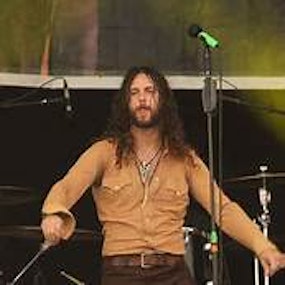
Aryn Black
Singer
Scorpion Child was formed in 2006 by singer Aryn Jonathan Black. The band experienced frequent personnel changes, with Black and lead guitarist Christopher Cowart as the only members to appear on both of the band's full-length albums. They were signed to the German-based independent label Nuclear Blast and worked with Grammy-nominated producer Chris “Frenchie” Smith on their two albums. Their music has been compared to Led Zeppelin, Uriah Heep, Rainbow, and Black Sabbath, and the band also cited Krautrock and doom metal bands like Pentagram, Hairy Chapter, and Lucifer's Friend as influences.
Scorpion Child released their self-titled debut album in June 2013. The album featured a lineup of Black, Cowart, rhythm guitarist Tom Frank, bassist Shaun Avants, and drummer Shawn Alvear; with contributions from previous guitarist Chris Hodge. In a review of the album, one reviewer described Scorpion Child as "a heavy-riffing behemoth that takes the current glut of guitar-slinging retro-copyists and punches them through the pavement." The album reached #31 on the Billboard Heatseekers chart. The song "Polygon of Eyes" was featured as the iTunes single of the week in June 2013.
Frank, Avants, and Alvear all left the band in 2014. Jon “The Charn” Rice, previously of the death metal band Job for a Cowboy, joined on drums and Alec Padron joined on bass. Instead of recruiting a new rhythm guitarist, the band added keyboardist AJ Vincent in early 2015. This lineup released the album Acid Roulette in June 2016. The album was noted for being h… Read More
Featured Episodes
Here are some great episodes to get started with


















